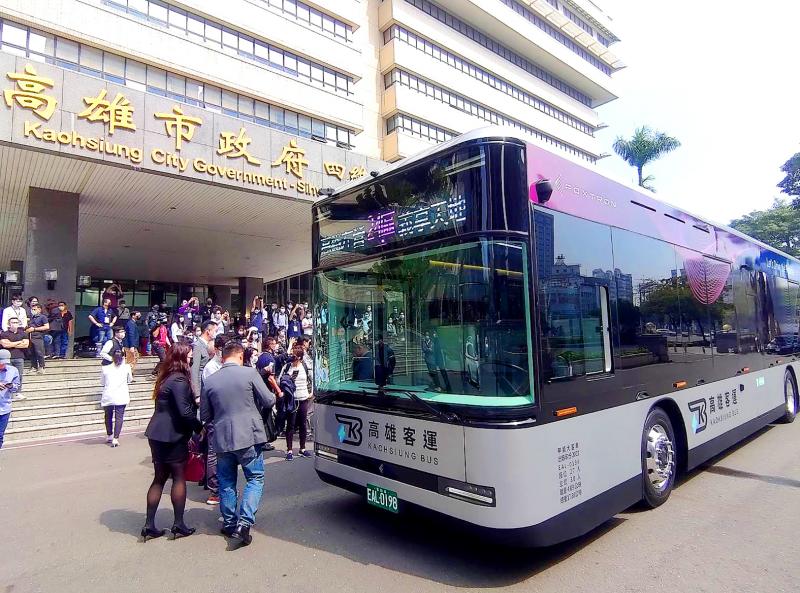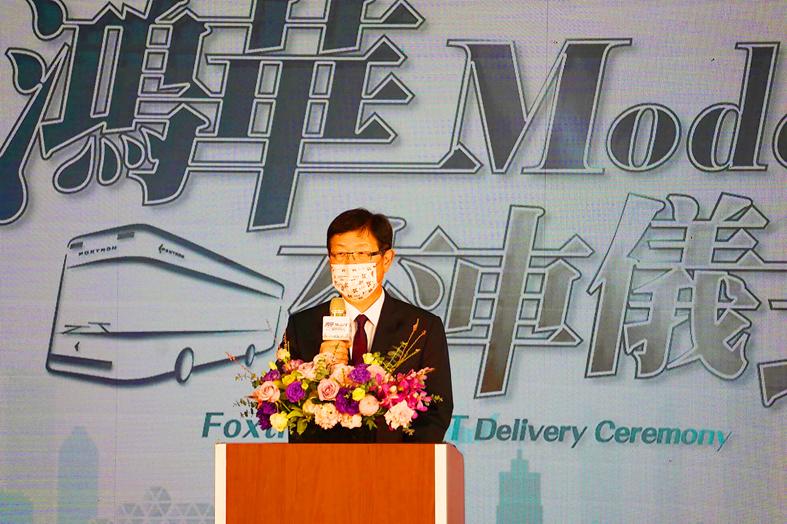Hon Hai Technology Group (鴻海科技集團) yesterday unveiled a blueprint to deploy an electric bus ecosystem in Kaohsiung, including plans for a manufacturing facility and battery pack capacity.
The group plans to create an electric vehicle (EV) design and manufacturing center in the Southern Taiwan Science Park’s (南部科學園區) newly developed section in Kaohsiung’s Ciaotou District (橋頭), Hon Hai chairman Young Liu (劉揚偉) told reporters.
To push for a greater proportion of its EV components to be supplied in-house, Hon Hai is mulling whether to make battery packs and cells at the Ciaotou Science Park (橋頭科學園區), Liu said.

Photo: Wang Jung-hsiang, Taipei Times
To provide seamless energy support, Hon Hai is assessing the feasibility of installing energy storage systems at the Ho Fa Industrial Park (和發產業園區) in the port city, he said.
The company aims to boost components supply from its MIH Open Platform members for three major electric systems — battery management, vehicle control and motor control units — to 90 percent by 2024, up from 65 percent currently, he said.
By 2024, it would be able to produce solid-state lithium-ion batteries and motor control systems, the company said.

Photo: CNA
Hon Hai plans to link its EV ecosystem to Kaohsiung’s smart city infrastructure by offering integrated solutions, Liu said.
It is in talks with the Kaohsiung City Government to scout potential sites for the project, he said.
Liu made the remarks at a news conference at which Foxtron Vehicle Technologies Co (鴻華先進) — a Hon Hai-Yulon Motors Co (裕隆) EV design and manufacturing venture — delivered its first electric Model T bus to Kaohsiung Bus Co (高雄客運), which is owned by San-Ti Group (三地集團).
The Kaohsiung-based conglomerate’s North-Star Petroleum Co (北基國際), a gasoline station chain, is to be in charge of installing EV chargers for buses built by Foxtron.
North-Star in April last year formed a partnership with Delta Electronics Inc (台達電) to introduce charging systems at the chain’s 57 gas stations.
Foxtron plans to deliver 30 electric buses to San-Ti this year, said Liu, who is Foxtron’s chairman.
Foxtron aims to ship up to 150 electric buses to local customers this year, the company said.
Foxtron is seeking a 50 percent share of the nation’s electric bus market by 2030, said Michael Kuo (郭耀聰), a special assistant to the company’s CEO.
To comply with the government’s proposed electrification plans, about 30,000 fossil-fuel-powered buses would have to be swapped for electric buses by that time, Kuo said.
Asked how Russia’s invasion of Ukraine would affect supply of key components, Liu said that some customers have asked that shipments to those countries be halted.
The supply of cabling for EVs has been affected, but the impact is insignificant at the moment, he said.
When asked about Hon Hai’s partnership with Lordstown Motors Corp, Liu said that a deal to buy assets of the Ohio-based EV maker went smoothly.
Hon Hai is making vehicles for the electric truck maker, he said.
However, Hon Hai has no intention to participate in Lordstown’s new fundraising program, Liu said.

Nissan Motor Co has agreed to sell its global headquarters in Yokohama for ¥97 billion (US$630 million) to a group sponsored by Taiwanese autoparts maker Minth Group (敏實集團), as the struggling automaker seeks to shore up its financial position. The acquisition is led by a special purchase company managed by KJR Management Ltd, a Japanese real-estate unit of private equity giant KKR & Co, people familiar with the matter said. KJR said it would act as asset manager together with Mizuho Real Estate Management Co. Nissan is undergoing a broad cost-cutting campaign by eliminating jobs and shuttering plants as it grapples

PERSISTENT RUMORS: Nvidia’s CEO said the firm is not in talks to sell AI chips to China, but he would welcome a change in US policy barring the activity Nvidia Corp CEO Jensen Huang (黃仁勳) said his company is not in discussions to sell its Blackwell artificial intelligence (AI) chips to Chinese firms, waving off speculation it is trying to engineer a return to the world’s largest semiconductor market. Huang, who arrived in Taiwan yesterday ahead of meetings with longtime partner Taiwan Semiconductor Manufacturing Co (TSMC, 台積電), took the opportunity to clarify recent comments about the US-China AI race. The Nvidia head caused a stir in an interview this week with the Financial Times, in which he was quoted as saying “China will win” the AI race. Huang yesterday said

TEMPORARY TRUCE: China has made concessions to ease rare earth trade controls, among others, while Washington holds fire on a 100% tariff on all Chinese goods China is effectively suspending implementation of additional export controls on rare earth metals and terminating investigations targeting US companies in the semiconductor supply chain, the White House announced. The White House on Saturday issued a fact sheet outlining some details of the trade pact agreed to earlier in the week by US President Donald Trump and Chinese President Xi Jinping (習近平) that aimed to ease tensions between the world’s two largest economies. Under the deal, China is to issue general licenses valid for exports of rare earths, gallium, germanium, antimony and graphite “for the benefit of US end users and their suppliers

Dutch chipmaker Nexperia BV’s China unit yesterday said that it had established sufficient inventories of finished goods and works-in-progress, and that its supply chain remained secure and stable after its parent halted wafer supplies. The Dutch company suspended supplies of wafers to its Chinese assembly plant a week ago, calling it “a direct consequence of the local management’s recent failure to comply with the agreed contractual payment terms,” Reuters reported on Friday last week. Its China unit called Nexperia’s suspension “unilateral” and “extremely irresponsible,” adding that the Dutch parent’s claim about contractual payment was “misleading and highly deceptive,” according to a statement